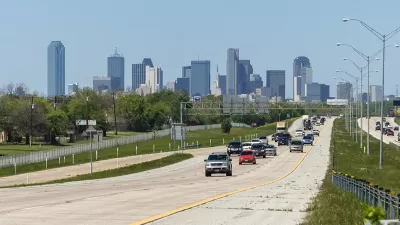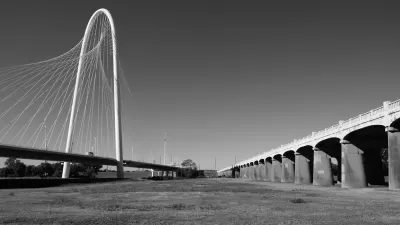Dallas reached another milestone in its years-long battle over a proposal to build a toll road through a park along the Trinity River on the edge of downtown. The latest version of the proposal so far hasn't cleared any controversies.
"At a meeting of the Transportation and Trinity River Project Committee, 12 of 15 council members heard from urban planner Larry Beasley about his so-called Dream Team’s new plan for the Trinity Parkway," reports Robert Wilonsky, who also offers a critical opinion of the results of their work: "which still looks and feels and sounds a lot like the highway everyone hated so much that Mayor Mike Rawlings called for this do-over."
After a year of work by a collection of planners and engineers, along with an appointed advisory committee, the Dream Team produced the following conceptual proposal:
The road will be four meandering lanes. Traffic will move at 45 miles per hour. There will only be a handful of on-and-off ramps. There will be trees everywhere. There will be U-turns and shoulder pull-over spots for those wanting to enjoy so-called “WOW” views. There won’t be trucks. There won’t be tolls. There will be park access.
Except Wilonsky remains skeptical that the talking points offered by the Dream team will live up to the reality of the proposal, if the proposal should be realized. Wilonsky writes:
Because, you see, that meandering road really doesn’t meander. And the lanes are wide and only getting wider — from 10 and 11 feet discussed last year to 11 and 12 feet in the latest iteration. And the proposed grass shoulders will probably wind up being gravel.
Wilonsky offers additional details about the park planning occurring concurrently as the road planning, and also previews potential next steps for the so-called "Dream Team."
FULL STORY: Wilonsky: The Dream Team’s Trinity Parkway still looks like nightmare toll road everyone hated

Alabama: Trump Terminates Settlements for Black Communities Harmed By Raw Sewage
Trump deemed the landmark civil rights agreement “illegal DEI and environmental justice policy.”

Study: Maui’s Plan to Convert Vacation Rentals to Long-Term Housing Could Cause Nearly $1 Billion Economic Loss
The plan would reduce visitor accommodation by 25% resulting in 1,900 jobs lost.

Planetizen Federal Action Tracker
A weekly monitor of how Trump’s orders and actions are impacting planners and planning in America.

Waymo Gets Permission to Map SF’s Market Street
If allowed to operate on the traffic-restricted street, Waymo’s autonomous taxis would have a leg up over ride-hailing competitors — and counter the city’s efforts to grow bike and pedestrian on the thoroughfare.

Parklet Symposium Highlights the Success of Shared Spaces
Parklets got a boost during the Covid-19 pandemic, when the concept was translated to outdoor dining programs that offered restaurants a lifeline during the shutdown.

Federal Homelessness Agency Places Entire Staff on Leave
The U.S. Interagency Council on Homelessness is the only federal agency dedicated to preventing and ending homelessness.
Urban Design for Planners 1: Software Tools
This six-course series explores essential urban design concepts using open source software and equips planners with the tools they need to participate fully in the urban design process.
Planning for Universal Design
Learn the tools for implementing Universal Design in planning regulations.
Caltrans
Smith Gee Studio
Institute for Housing and Urban Development Studies (IHS)
City of Grandview
Harvard GSD Executive Education
Toledo-Lucas County Plan Commissions
Salt Lake City
NYU Wagner Graduate School of Public Service




























